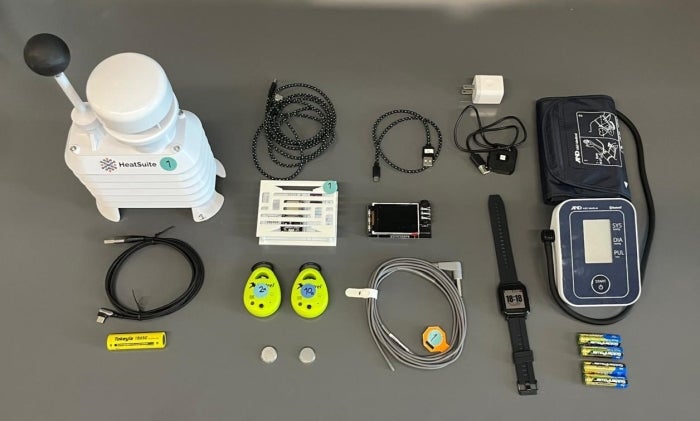ASU researchers working to better understand individual experiences of heat exposure

ASU researchers are at the helm of a new global heat study, and those eligible to participate in the pilot study in Phoenix can receive up to $200 in rewards. Photo courtesy Pixabay
Is it getting hot in here, or is it just you?
Following record-smashing temperatures this past summer, Arizona State University researchers are working to better understand individual experiences of heat exposure during people’s everyday routines.
Interested in participating?
Those eligible to participate in the pilot study in Phoenix will receive up to $200 in rewards through gift cards, provided as the study advances and based on data completeness.
Access the pre-screening survey here.
In an upcoming global heat study, funded by the National Science Foundation, ASU researchers Gisel Guzman and principal investigator Jennifer Vanos will use a smartwatch, weather sensors and participant surveys to measure heat exposure, cool-seeking behavior, perceptions and health risks as people go about their regular days.
They are currently seeking participants for the study, which will be piloted in the Phoenix Metro area this summer — other locations to be included are Colombia, Sydney and Montreal. The study aims to better understand how behavioral practices and physiological responses differ by country and culture.
Vanos said heat researchers already know that individuals experience heat differently depending on their age, medical conditions or other factors. They also know that heat is a growing concern for Phoenix residents, especially after this past summer’s record-breaking temperatures contributed to at least 600 heat-related deaths across Maricopa County. What they don’t know is exactly how heat impacts a person’s everyday routines and habits.
“A lot of heat research looks very closely at heat-related hospitalizations or deaths, but there is a significant knowledge gap in understanding day-to-day exposure that just about everyone encounters,” said Vanos, an associate professor in the School of Sustainability and a senior Global Futures scientist at ASU’s Julie Ann Wrigley Global Futures Laboratory. “What people actually experience this summer is going to vary from person to person.”
Fifty participants who have reliable access to shelter and are over 45 years old will receive small weather sensors — one for their home and another wearable version — and a smartwatch to collect data on indoor and outdoor temperatures, participant heart rate and skin temperature. The data collected also includes surveys and self-report smartwatch questionnaires. Participants simply go about their days as usual, accompanied by their smartwatch and small weather sensors.
“We really want to look at how people experience heat at the individual level,” said Guzman, a PhD geography candidate at the School of Geographical Sciences and Urban Planning. “Atmospheric models often don't represent the actual heat people are exposed to, and there is a major behavioral component to heat exposure that hasn’t really been studied. This is a really unique project because it combines personalized data and real-time feedback from those who are doing this study with us.”
The series of tools used, referred to as a HeatSuite, remotely gather information throughout the day. The HeatSuite technology was developed by Nick Ravanelli, an assistant professor at Lakehead University in Canada. The weather sensors measure air temperature, humidity, wind speed and globe temperature; the smartwatch is used for heat perception, physiological impacts and the participant’s indoor or outdoor position.
Because the technology was developed by a member of the research team, the data collected belongs to the research team — and not an external company. This, Ravanelli said, is a major advantage to not using commercial software or hardware solutions for fieldwork.
“The terms of service for these software/hardware companies typically describe the sharing of data generically, but they do not always report back to you the exact trail of where your data went,” he said. “HeatSuite was born to help researchers reclaim data governance when conducting remote data collection projects, enable greater creativity in their scientific inquiry, and scale efficiently.”
Vanos said the data is not only important because it fills a knowledge gap for researchers: It can also empower participants to learn more about themselves and their own reactions to extreme heat. Additionally, data like this can greatly inform major global heat-adaptation efforts.
“If we think about global heat-adaptation needs, it's going to look completely different in Montreal from somewhere like Colombia,” Vanos said. “The way our cities are built often reflects people's behavior and understanding of the heat. In Phoenix, we tend to keep our routines the same so long as we have access to air conditioning, but that isn’t the case everywhere. I’m looking forward to seeing what the data tells us.”
More Environment and sustainability

'Earth Day Amplified' promotes power of collective action
Everybody loves the concept of sustainability. They want to do their part, and the chance to say they’ve contributed to the well-being our of planet.But what does that actually mean?Arizona State…

Rethinking Water West conference explores sustainable solutions
How do you secure a future with clean, affordable water for fast-growing populations in places that are contending with unending drought, rising heat and a lot of outdated water supply infrastructure…
Meet the young students who designed an ocean-cleaning robot
A classroom in the middle of the Sonoran Desert might be the last place you’d expect to find ocean research — but that’s exactly what’s happening at Harvest Preparatory Academy in Yuma, Arizona.…


